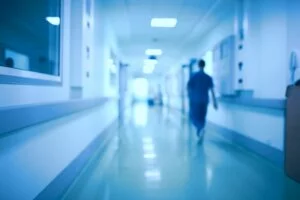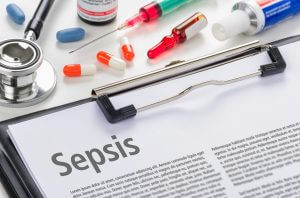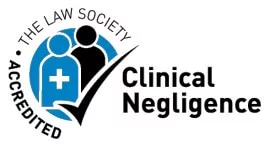GP Negligence Claims
Can I Sue My GP for Negligence?
If you suspect a negligent GP or doctor has harmed you, it's important to understand your rights and options for claiming compensation.
“Small but very effective and experienced team so every client benefits from the personal touch but also highly skilled litigation know-how. Capability of the team means they can handle all aspects of very complex cases as well as straightforward matters.”
“Osbornes Law is an established firm which handles a breadth of complex and high-value clinical negligence matters.”
Suing a doctor for negligence: Your rights explained
All UK residents are entitled to access care from a General Practitioner (GP) through the NHS. GPs are trained medical professionals who serve as the first point of contact in the healthcare system, diagnosing and treating a wide range of conditions and referring patients for specialist or emergency care when needed.
If you believe that you’ve suffered harm because of a GP’s mistake or substandard care, you may be entitled to pursue a GP negligence claim. This is a type of clinical negligence claim, where compensation may be available for the physical, emotional, and financial harm caused by a doctor’s failure to meet expected standards.
What is GP negligence?
GP negligence refers to situations where a GP fails to provide medical care that meets the accepted professional standard, resulting in harm or injury to a patient that could have been avoided. This can include a range of actions or omissions, including misdiagnosis, delayed diagnosis, medication errors, or failure to refer to specialists when necessary.
Can I sue my GP for negligence?
Yes, you can sue your GP if their care falls below the standard expected of a reasonably competent doctor and this directly causes you harm or worsens your condition. If you believe your GP’s actions have caused you unnecessary suffering, you may be able to claim compensation.
Standards of care
The Royal College of General Practitioners operates two schemes to assess the care standards of GP practices. A practice may be awarded the Quality Practice Award if it provides ‘exceptional care.’ At the same time, it may receive ‘Practice Accreditation’ if it provides a wide range of ‘safe, high-quality, and responsive care.
Every patient has a right to good quality health care based on best practice guidelines. You should receive drugs and treatment appropriate to your condition and recommended by the National Institute for Health and Clinical Excellence.
However, despite guidelines, quality awards, and extensive training, GPs can and do make mistakes. Sometimes, these mistakes rise to the level of medical negligence. These mistakes can sometimes lead to surgical negligence claims, especially when errors occur during surgical procedures.
How do I prove a negligent GP claim?
To establish that a GP has been negligent, it must be shown that:
- There was a duty of care
- That duty of care was not met
- Due to this breach of care, harm was caused
Successfully proving these elements can lead to compensation claims for the harm caused by the GP’s negligence. Medical negligence cases cover all aspects of GP care, some of which make the national headlines.
Common types of GP negligence
According to the Medical Defence Union, which provides insurance for around half of GPs, claims for misconduct and poor practice are rising.
Among the most frequent claims are:
- Cancer misdiagnosis
- Failure to diagnose infections
- Missed ectopic pregnancy
- Undiagnosed fractures
These errors can lead to serious harm, long-term complications, or even death. At Osbornes Law, our specialist medical negligence solicitors have represented hundreds of clients affected by GP and doctor negligence. If you’ve suffered due to substandard medical care, you may be entitled to compensation.
Real-world examples of GP Negligence
Gosport War Memorial Hospital
One of the most serious examples of GP negligence involved the Gosport War Memorial Hospital, where over 450 elderly patients died after being prescribed unnecessary and dangerous levels of painkillers.
Dr Jane Barton, a GP who supported the hospital’s wards, prescribed high doses of diamorphine through syringe drivers—despite the medication not being clinically justified for the patients’ conditions. This practice continued for 12 years.
Although hospital consultants were aware of these prescribing practices, they failed to intervene. Nurses raised concerns but were reportedly warned not to escalate them. An official inquiry later found an “institutionalised regime” of unsafe prescribing, contributing directly to avoidable deaths.
As of early 2025, Kent Police have identified 29 suspects in connection with the deaths at the hospital. The High Court has ordered new inquests into the deaths of several patients, including Gladys Richards, Arthur Cunningham, and Robert Wilson. These inquests aim to provide a thorough examination of the circumstances surrounding their deaths.
GP negligence case studies: How Osbornes Law help patients
While the Gosport case is extreme, it underscores how dangerous poor GP care can be. At Osbornes Law, we support patients affected by GP negligence every day—often in less high-profile but equally life-altering situations.
Our experienced medical negligence solicitors have acted in a wide range of successful claims involving GP errors such as delayed diagnosis, failure to refer, and inappropriate prescribing.
Here are some real case studies we’ve recently settled:
- Inappropriate prescribing: A woman received a six-figure settlement after being prescribed an antibiotic for eight times longer than recommended, resulting in irreversible lung damage.
- Failure to diagnose: A man settled a medical negligence claim against two former GPs after they allegedly failed to identify classic symptoms of Giant Cell Arthritis and refer him for investigation and treatment.
- Missed urgent symptoms: A woman secured compensation after her GP failed to spot her detached retina, leading to significant vision loss.
These cases demonstrate our commitment to holding medical professionals accountable and helping patients secure the compensation they deserve.
GP negligence compensation: What you need to know
If you’ve suffered harm because of poor care from your GP, you may be entitled to compensation. GP negligence compensation is designed to help patients recover the financial and personal losses caused by substandard treatment.
This can include:
- Medical expenses for corrective treatment
- Loss of earnings or future income
- Pain and suffering—both physical and emotional
- Care and rehabilitation costs
- Impact on your quality of life
At Osbornes Law, our specialist medical negligence solicitors are here to help you understand your rights and secure the compensation you deserve.
How much compensation could I receive?
The amount of compensation you could receive for doctor negligence depends on several key factors, including:
- The severity of your injury
- The impact on your daily life and future health
- The financial losses you’ve experienced
- The level of negligence involved
For example, a minor delay in treatment might result in a lower award than a serious misdiagnosis with long-term effects. Every case is unique, which is why we offer tailored advice to help you understand the potential value of your claim.
How to make a GP or doctor negligence compensation claim
Making a claim for GP negligence follows the same process as other medical negligence claims. Here’s what to expect:
- Initial consultation: We’ll listen to your experience and assess whether you may have grounds for a claim.
- Gathering evidence: This includes your medical records, expert opinions, and other relevant documentation.
- Making a formal complaint: You can raise your concerns directly with the GP practice or escalate the matter to the NHS, your local health board, or the General Medical Council (GMC).
- Building your case: If a duty of care was breached and you were harmed as a result, we’ll work with you to pursue compensation.
- Negotiation or court proceedings: Most claims settle out of court, but we are fully prepared to represent you if necessary.
We handle most cases on a no win, no fee basis, so you won’t pay legal fees unless your claim is successful.
Time limits for GP negligence claims
In most cases, you have three years to start a claim—either from the date the negligent treatment occurred or the date you first became aware of the harm caused.
There are exceptions:
- Children: The three-year time limit doesn’t begin until their 18th birthday.
- Lack of mental capacity: There is no time limit unless the person regains capacity.
Because time limits can vary, it’s important to seek legal advice as soon as possible. Our solicitors can confirm the deadline that applies to your case and ensure action is taken within the legal timeframe.
Why choose our Osbornes Law?
We are recognised specialists in medical negligence claims, with decades of experience helping patients recover compensation after suffering due to GP errors.
- Award-winning law firm
- Recognised by Legal 500 and Chambers UK
- Proven success in GP negligence cases
Contact Osbornes Law today for expert advice on making a GP negligence claim. To speak with one of our solicitors, contact us by:
- Filling in our online enquiry form; or
- Calling us on 020 7485 8811
FAQs
Why is accessing GP appointments increasingly difficult?
Access to GP appointments has become challenging due to a shift towards online-only booking systems, coupled with a shortage of qualified GPs. This has led to reduced availability and significant delays for many patients.
What problems arise from online-only booking systems for GP appointments?
Online-only booking creates barriers, particularly for elderly or vulnerable patients who may lack technological skills or internet access. It can also cause delays even for technologically proficient users due to system inefficiencies and demand.
Are alternative healthcare provisions like Pharmacy First sufficient substitutes for GP appointments?
While initiatives like Pharmacy First help manage minor conditions without GP involvement, many patients prefer direct access to GPs, particularly for more complex issues. Pharmacy services cannot entirely replace the expertise and care provided by GPs.
Speak to us about a GP Negligence Claim
Call us 020 7485 8811
Email us Send us an email and we’ll get back to you
Small but very effective and experienced team so every client benefits from the personal touch but also highly skilled litigation know-how. Capability of the team means they can handle all aspects of very complex cases as well as straightforward matters.
Osbornes is a very respected firm in the marketplace.
They handle really complex cases very well
The clinical negligence team are knowledgeable and professional in their approach and demonstrate a high level of skill in litigation work.
Osbornes Law offers experience in obstetric and fatal claims as well as niche cauda equina cases.
Osbornes Law is an established firm which handles a breadth of complex and high-value clinical negligence matters.
Osbornes has a skilled team of solicitors advising clients on a wide range of clinical negligence matters.
Hard working, approachable, good knowledge of clinical negligence and clients’ specific conditions
A joy to work with and always 100% client focused at all times.
The clinical negligence team at Osbornes is much lauded for its ability to ‘represent the diverse range of London-based clients
“The team is very quick and efficient in responding."
"Obsbornes Law is always client-focused and works tirelessly to obtain the best outcomes for clients."
‘They are ambitious for their clients and expect high standards from all who work with them.’
"Osbornes somehow combine the accessibility of a local firm, with the professional standards of a national or city outfit."
"Osbornes, is described as having ‘superb judgement and a medical knowledge that is second to none."
Stephanie has developed a particularly strong reputation for her handling of birth injury claims, as well as cases concerning surgical negligence and delays in surgery.
"An excellent firm which achieves fantastic outcomes for clients."
"Stephanie Prior takes on complex cases and gets excellent results. She has a background in medicine which serves her clients well and is a realistic but tough litigator."
"Stephanie Prior is hugely dedicated, adored by her clients, tenacious, efficient and extremely knowledgeable."
"Stephanie Prior is very good with troubled clients and is easily able to make them feel at ease."
"Stephanie shows sensitivity and deals with things in an understanding way."
Osbornes provides a very intimate and personal client service which is increasingly rare in this sector.
The lawyers in the team are highly experienced and will drive cases very hard on behalf of their clients.
"Stephanie Prior has a realistic attitude to the complexities of the cases. She wins the trust of her clients and goes the extra mile to ensure they get the best outcomes."
"Stephanie Prior... manages a varied caseload, including obstetric claims, child and adult brain injury cases and fatal and non-fatal spinal cord injury cases."
"Stephanie is experienced, knowledgeable of all aspects of clinical negligence work, and strategic in running cases."
"An exceptional outfit. They take on difficult cases, fight hard and win."
"The team were extremely professional in putting my needs first. There was a joined-up approach to catering for the client, and all lawyers involved were briefed and constructive."
Stephanie Prior is always very professional and kind. Highly recommended.
Quite simply excellent, with a highly competent and well-rounded team. They understand complex medical litigation and have been our lifesavers, and we will always owe them our immense gratitude.
News & InsightsVIEW ALL
- 19.9.2023
Appendicitis Compensation Claim
Appendicitis misdiagnosis case settles for 5-figure sum Osbornes Law were instructed in a medical negligence claim against Bedfordshire Hospitals NHS...
Read more - 6.7.2022
GP Negligence Case
GP negligence leads to fatality Osbornes acted for a Claimant who brought proceedings on behalf of the estate of her...
Read more - 18.11.2021
How do I obtain my GP medical records...
If you want to obtain copies of your medical records from your GP or the hospital where you have been...
Read more - 3.10.2021
Greater Awareness of Sepsis Needed
Greater awareness of Sepsis can lead to better outcomes As medical negligence lawyers, we were particularly interested to hear about...
Read more - 13.7.2021
Substandard GP Care Results in Severe Vision Loss:...
Substandard GP Care Leads to Profound Vision Loss Stephanie Prior acted on behalf of J in connection with a claim...
Read more













